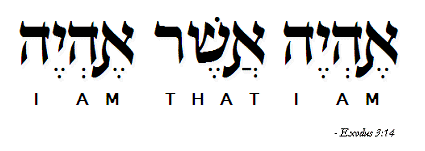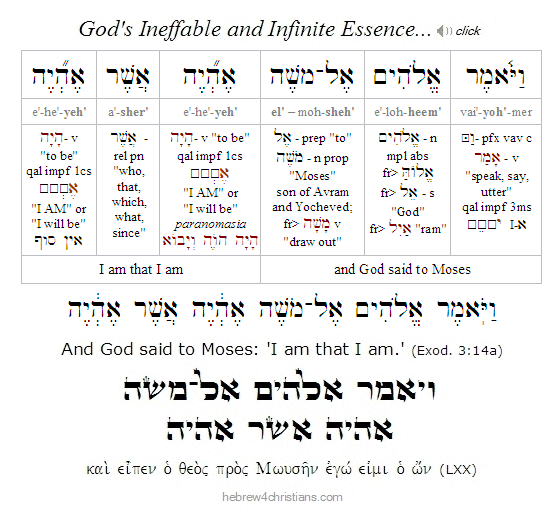|
In our Torah portion this week, Moses asked for God's Name, and God then said eheyeh asher eheyeh (אֶהְיֶה אֲשֶׁר אֶהְיֶה), "I AM that I AM" (or "I will be what I will be"), abbreviated simply as eheyeh (אֶהְיֶה), "I AM" (Exod. 3:14). Note that God identifies himself with being itself, since eheyeh is the Qal imperfect form of the verb hayah (הָיָה), meaning "to be." Indeed, the Name YHVH (יהוה) essentially means "Presence," since God is called ha-hoveh, ve'hayah, ve'yavo (הַהוֶה וְהָיָה וְיָבוֹא) - "the One who is, and was, and is to come" (Rev. 4:8). This "threefold Name" of the LORD of Hosts encompasses all possible states of being, indicating that God is LORD over all possible worlds...
וַיּאמֶר אֱלהִים אֶל־משֶׁה אֶהְיֶה אֲשֶׁר אֶהְיֶה
וַיּאמֶר כּה תאמַר לִבְנֵי יִשְׂרָאֵל
אֶהְיֶה שְׁלָחַנִי אֲלֵיכֶם
va·yoh'·mer · E·loh·heem · el - Mo·she · e·he·yeh · a·sher · e·he·yeh
va·yoh'·mer · koh · toh·mar · leev·nei · Yees·rah·el
e·he·yeh · she·lah·cha'·nee · a·le·khem

"God said to Moses, "I AM WHO I AM."
And he said, "Say this to the sons of Israel,
'I AM has sent me to you.'" (Exod. 3:14)
Download Study Card

Hebrew Lesson
Exodus 3:14a Hebrew reading (click):
The phrase eheyeh asher eheyeh indicates a connection between the Name YHVH (יהוה) and being itself. YHVH is the Source of all being and has being inherent in Himself (i.e., He is necessary Being), and everything else - from the most gigantic of cosmic objects to the structure of cellular DNA - contingently derives its existence and being from Him. The name YHVH also bespeaks the utter transcendence of God. In Himself, God is beyond all "predications" or attributes of language: He is the Source and Foundation of all possibility of utterance and thus is beyond all definite descriptions.
Note, however, that though the Name is transcendent and above all categories, God went on to further denote the meaning of His Name through a series of human relationships: "Say this to the people of Israel, 'The LORD (יהוה), [namely] the God of your fathers, [namely] the God of Abraham (אֱלהֵי אַבְרָהָם), [namely] the God of Isaac (אֱלהֵי יִצְחָק), and [namely] the God of Jacob (אֱלהֵי יַעֲקב), has sent me to you.' This is my Name forever (זֶה־שְּׁמִי לְעלָם), and thus I am to be remembered throughout all generations" (Exod. 3:14-15). In other words, the Name of the LORD contains both the idea of His utter transcendence as well as His immanence; He is the "Master of the Universe" as well as the personal Savior and Lord of the patriarchs and the Jewish people.... The LORD (יהוה) calls Himself "the God of Israel" to link His faithful love with His Salvation, and indeed, this Name is revealed as Yeshua (Jesus), which is the Name above all Names, the Savior of the world....
Beware of those "Messianic" or "Hebrew roots" ministries that advocate a "special name" for God other than (or over and above) the name of Yeshua (יֵשׁוּעַ). One way to test the spirits on this question is to determine if the ministry plainly confesses (and celebrates) that Yeshua is indeed the LORD God Almighty, the "Name above all Names" (Phil. 2:9-11) -- or whether they waffle on this issue by focusing instead on the name YHVH... Do they spend an exorbitant amount of time and energy on the phonetics of the name of God, offering permutations or linguistic variations while overlooking the fact that the Name refers to Something beyond the merely linguistic? Do they disdain the name Jesus or ridicule Christians who use the name "Christ," regarding them as "pagan" or "Gentile"? Are they part of the "Sacred Name" movement (i.e., cult)? Do they attempt to impress you with the secret meaning of Hebrew words and spurious intellectualism? Do they suggest that Christian theology is inherently suspect and should not be trusted? Do they mock the idea of the Trinity as incoherent or perhaps even unscriptural? Test the spirits. Ask yourself if they are missing the point of God's revelation by taking the Name of the LORD in vain.
Note: Some people may pedantically insist that eheyeh should not be translated as "I AM" but rather as "I WILL BE," since the verb form is grammatically "imperfect," that is, expressing ongoing or future action. However, the semantic point of the revelation of God's Name is to indicate that He is the utterly transcendent Master of the Universe, and therefore categories of time, that is, past-present-future must be subsumed under this greater idea. God is LORD over all possible places and times (i.e., ὁ ἦν καὶ ὁ ὢν καὶ ὁ ἐρχόμενος).
Other people might object to the name "Jesus," claiming that it has pagan connotations. However, there is absolutely nothing misleading about the name Jesus, even though it is a Latin transliteration (i.e., IESUS) derived from the Greek transliteration (᾽Ιησοῦς) of the original Hebrew name Yehoshua (יְהוֹשֻׁעַ), which later appears in its shortened form as Yeshua (יֵשׁוּעַ), e.g., 1 Chron. 24:11; Neh. 8:17. Note that the name Yehoshua comes from the verb יָשַׁע, "to save," and יה, a shortened form of YHVH, and therefore means "the LORD saves." According to the late Dr. David Flusser, Professor of Early Christianity and Judaism of the Second Temple Period at the Hebrew University of Jerusalem, "Yeshua" was the third most popular male name during the time of the Second Temple period.
 |
|





